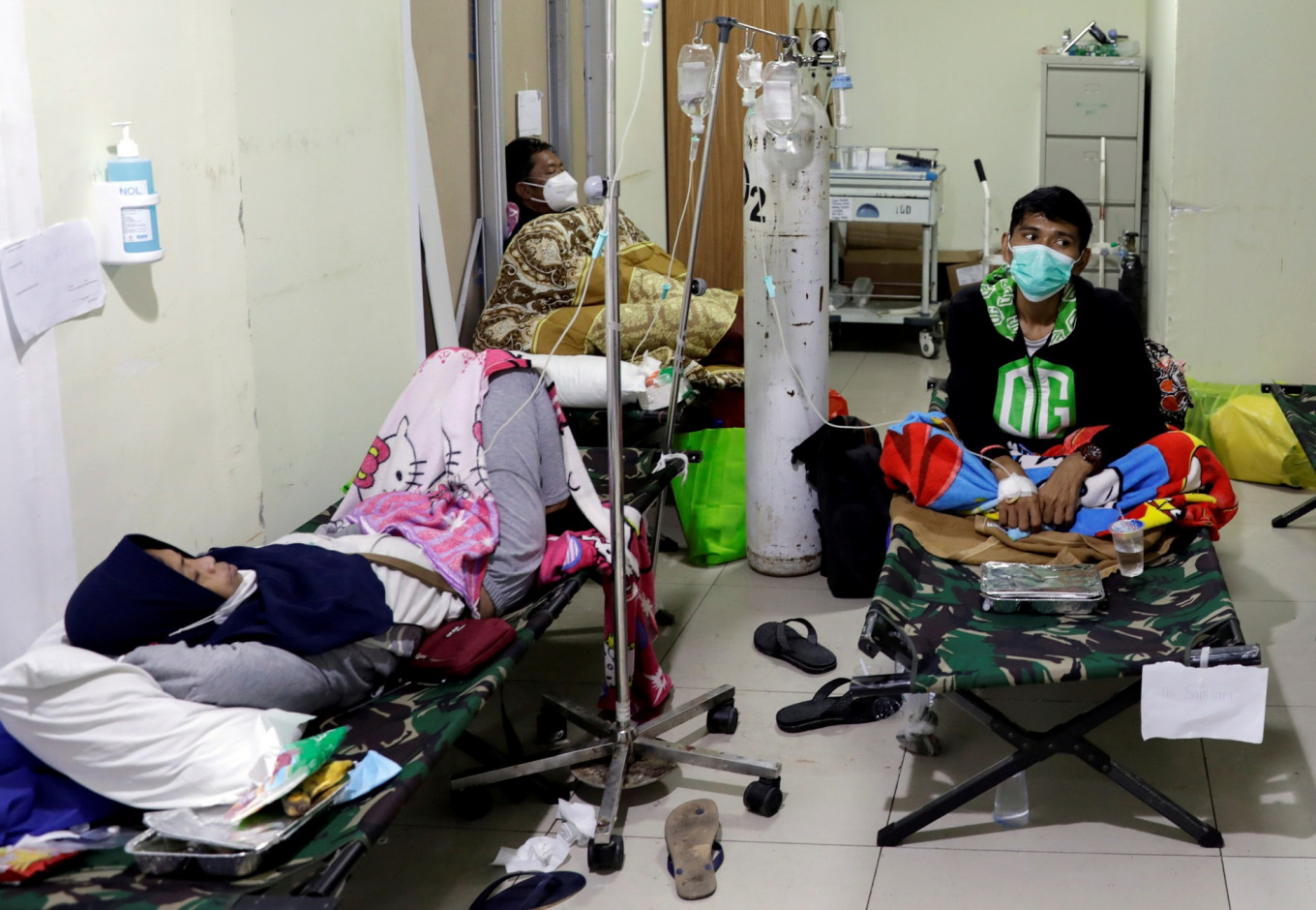Popular Reads
Top Results
Can't find what you're looking for?
View all search resultsPopular Reads
Top Results
Can't find what you're looking for?
View all search resultsRI loses out as citizens spend billions on health care abroad
The number of Indonesian patients abroad grew to 600,000 in 2015 from 350,000 in 2006, according to PricewaterhouseCoopers (PwC).
Change text size
Gift Premium Articles
to Anyone
I
ndonesian patients continue to have a high appetite for treatment abroad as the government struggles to provide quality medical services, costing the country billions of dollars that could be spent domestically to boost the local healthcare industry.
The government estimates that Indonesians spend between Rp 100 trillion (US$7 billion) and 150 trillion annually for medical services abroad. The number of Indonesian patients abroad grew to 600,000 in 2015 from 350,000 in 2006, according to PricewaterhouseCoopers (PwC).
It has increased much more since then.
Speaking at the groundbreaking event for the International Hospital Bali on Dec. 27, President Joko “Jokowi” Widodo put that number at “more or less 2 million”, an estimate likely referring to the time before the outbreak of the COVID-19 pandemic.
Singapore and Malaysia are among the countries most visited as Indonesians believe they get better treatment there than local hospitals provide. About 80 percent of medical tourists in Malaysia come from Indonesia, according to Tourism Malaysia data.
Heart and cancer diseases are among the most common concerns for which Indonesians seek treatment abroad. Unsurprisingly, higher-income Indonesians are the most likely to pay for medical services abroad.
“We must become a host for medical tourism. For now, we do not have to aim for Americans or Europeans, but let’s think about how we can give better medical services to our residents first,” Indonesia Medical Tourism Association (AWMI) chairman Taufik Jamaan said in a statement on Dec. 21.
The AWMI said Indonesia had been just a spectator for a long time as countries like Singapore, Malaysia and Thailand benefitted from around 2 million healthcare-related visits by Indonesians.
The country could turn things around, Taufik said, adding that the industries of health care and tourism should cooperate to make that happen, while improving awareness among citizens. As a near-term goal, they should aim to acquire at least 10 percent of the funds Indonesians spend on medical services abroad.
Read also: Indonesia mulls over plan to develop medical tourism at home
Institute for Development of Economics and Finance (Indef) executive director Tauhid Ahmad said on Dec. 22 that outbound medical travel had a significant impact on the economy as large sums of money were spent abroad instead of at home, which negatively affected Indonesia’s current account balance.
Each time a person went abroad, they would take their relatives, racking up bills on hotels, airfares and daily consumption in the destination, he argued, adding that spending could go up significantly if it included tourism.
Indonesian Private Hospitals Association (ARRSI) secretary-general Ichsan Hanafi claimed local hospitals – in terms of medical staff and equipment – were quite capable of providing treatment Indonesians were seeking abroad.
Ten hospitals in Jakarta and Surabaya had international accreditation and could convince Indonesian patients to opt for domestic rather than foreign treatment, he told The Jakarta Post on Dec. 22.
He expressed hope for the government to support local healthcare facilities by lowering import taxes on healthcare technology and equipment, arguing that cost was one of many factors affecting Indonesia’s competitiveness in the industry.
He said hospitals in India and Malaysia could attract patients because of low costs for medicine and equipment, which they produced locally, whereas Indonesia still relied mostly on imports.
Indonesian Public Health Association (Iakmi) researcher Bigwanto, meanwhile, said the reasons for Indonesian patients going abroad were more complex and could not be reduced to a lack of inter-sector cooperation or health equipment.
Doctors were not providing adequate treatment, especially when outpatients came for counseling and consulting, because of a high workload, he opined. Doctors often needed to see many patients and work at two or three different hospitals a day, he told the Post on Dec. 22.
“Dissatisfaction then grows among patients. Disappointed, they look for a second opinion [overseas],” Bigwanto said, adding that they expected to find better medical services in Singapore and Malaysia.
The high workload was rooted in a longstanding problem, a shortage of doctors, as the country did not produce enough doctors to match its population.
World Bank data show that Indonesia has only 0.4 physicians per 1,000 inhabitants, the second-lowest rate in ASEAN and far behind the 0.7 per 1,000 in Timor-Leste, a country much poorer than Indonesia in terms of per-capita GDP.
The lack of doctors was partly caused by costly medical schools amid a lack of government support, Bigwanto explained, which prompted many doctors to take jobs at several hospitals to recoup their tuition expenses.
Health Minister Budi Gunadi Sadikin said on Dec. 13 that healthcare reforms were underway that could reduce the number of citizens going abroad for medical services.
Increasing the number of hospital beds, improving service quality and equipment and simplifying regulations to allow foreign health professionals to work in Indonesia were among the envisioned changes and expected to create opportunities for investment and cooperation.
"[This is done] so that we will not have 600,000 Indonesians going to [other] ASEAN countries just to have medical check-ups," he said, citing PwC data.
Read also: Health Minister Budi seeks to curb outbound medical tourism
Stefanus Ade Hadiwidjaja, chief investment officer at the Indonesia Investment Authority (INA), said on Dec. 16 that the sovereign wealth fund was planning large-scale investments to develop world-class healthcare services.
In doing so, the wealth fund says, it aims to improve healthcare infrastructure and services, and the engagement could be expanded to pharmaceutical manufacturing, including the production of vaccines.
“So, there are a lot of things we can do with the goal to provide access to quality healthcare for everyone,” Stefanus said.
The government has also committed itself to turning Indonesia into a medical tourism destination. In September, Tourism and Creative Economy Minister Sandiaga Uno told Tempo magazine about three provinces considered for that purpose: North Sumatra, Jakarta and Bali.
In September, Coordinating Maritime Affairs and Investment Minister Luhut Pandjaitan announced a plan to form the Indonesia Health Tourism Board (IHTB) for the development of medical tourism.
However, oncologist Ario Djatmiko, the founder of the Surabaya Oncology Hospital, said in September that building the IHTB among many other medical reforms would take time and should be prepared accordingly.
He noted that Indonesia would face competition from other countries that had a head start and had developed their brands over decades. Singapore and Malaysia had begun to build their brands in 1990 and 1998, respectively, and while Malaysia was well known for affordable medical treatment, Singapore was known for premium services.
“The IHTB could not just jump into the market. It needs careful preparation or it won’t sell anything,” Ario said during a webinar.
During the pandemic, noted the ARRSI’s Ichsan when speaking to the Post, local hospitals had seen an increase in patients as travel restrictions prevented Indonesians from seeking treatment abroad. He encouraged hospitals to capitalize on that opportunity.










